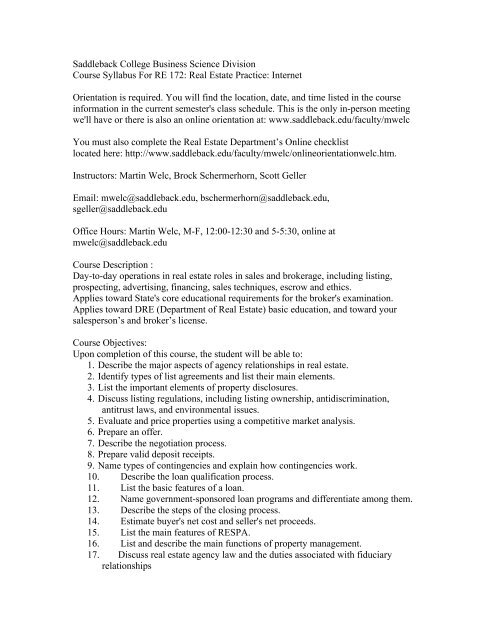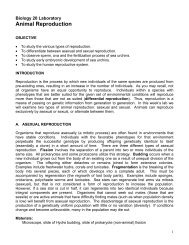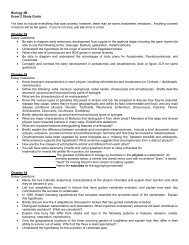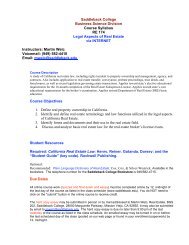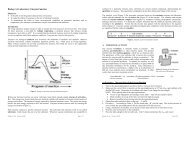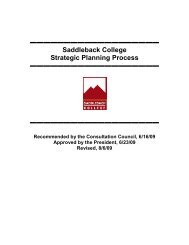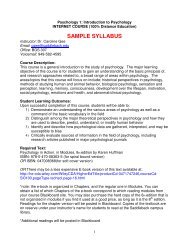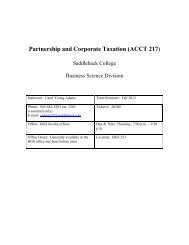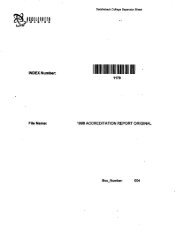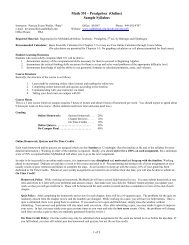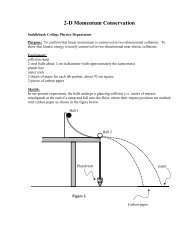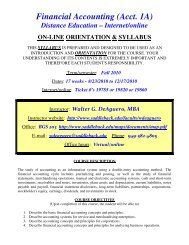Real Estate Practice - Saddleback College
Real Estate Practice - Saddleback College
Real Estate Practice - Saddleback College
Create successful ePaper yourself
Turn your PDF publications into a flip-book with our unique Google optimized e-Paper software.
<strong>Saddleback</strong> <strong>College</strong> Business Science Division<br />
Course Syllabus For RE 172: <strong>Real</strong> <strong>Estate</strong> <strong>Practice</strong>: Internet<br />
Orientation is required. You will find the location, date, and time listed in the course<br />
information in the current semester's class schedule. This is the only in-person meeting<br />
we'll have or there is also an online orientation at: www.saddleback.edu/faculty/mwelc<br />
You must also complete the <strong>Real</strong> <strong>Estate</strong> Department’s Online checklist<br />
located here: http://www.saddleback.edu/faculty/mwelc/onlineorientationwelc.htm.<br />
Instructors: Martin Welc, Brock Schermerhorn, Scott Geller<br />
Email: mwelc@saddleback.edu, bschermerhorn@saddleback.edu,<br />
sgeller@saddleback.edu<br />
Office Hours: Martin Welc, M-F, 12:00-12:30 and 5-5:30, online at<br />
mwelc@saddleback.edu<br />
Course Description :<br />
Day-to-day operations in real estate roles in sales and brokerage, including listing,<br />
prospecting, advertising, financing, sales techniques, escrow and ethics.<br />
Applies toward State's core educational requirements for the broker's examination.<br />
Applies toward DRE (Department of <strong>Real</strong> <strong>Estate</strong>) basic education, and toward your<br />
salesperson’s and broker’s license.<br />
Course Objectives:<br />
Upon completion of this course, the student will be able to:<br />
1. Describe the major aspects of agency relationships in real estate.<br />
2. Identify types of list agreements and list their main elements.<br />
3. List the important elements of property disclosures.<br />
4. Discuss listing regulations, including listing ownership, antidiscrimination,<br />
antitrust laws, and environmental issues.<br />
5. Evaluate and price properties using a competitive market analysis.<br />
6. Prepare an offer.<br />
7. Describe the negotiation process.<br />
8. Prepare valid deposit receipts.<br />
9. Name types of contingencies and explain how contingencies work.<br />
10. Describe the loan qualification process.<br />
11. List the basic features of a loan.<br />
12. Name government-sponsored loan programs and differentiate among them.<br />
13. Describe the steps of the closing process.<br />
14. Estimate buyer's net cost and seller's net proceeds.<br />
15. List the main features of RESPA.<br />
16. List and describe the main functions of property management.<br />
17. Discuss real estate agency law and the duties associated with fiduciary<br />
relationships
18. Explain the ways agency relationships can be created and terminated<br />
19. Describe agency disclosure requirements and disclosure forms, and<br />
emphasize the potential penalties for failure to disclose required information in a<br />
timely fashion<br />
20. Identify the different types of agency relationships<br />
21. Summarize the practical aspects of agency relationships in daily business<br />
activities, with emphasis on activities and behaviors that could result in<br />
disciplinary actions or other penalties<br />
22. Describe the role of listing agreements in real estate transactions<br />
23. Contrast the key features of different types of listing agreements<br />
24. Identify the required (legal) elements in every listing agreement, and explain<br />
the importance of core provisions<br />
25. Discuss mandatory property disclosure requirements, and the forms used to<br />
make those disclosures<br />
26. Summarize the legal issues and duties real estate agents should be aware of<br />
during the process of establishing and implementing a listing agreement<br />
relationship with a property seller<br />
27. Discuss the laws that directly affect the processes of listing and marketing a<br />
property<br />
28. Explain the ways in which antidiscrimination, antitrust, and environmental<br />
laws affect the practice of real estate<br />
29. Describe how the <strong>Real</strong> <strong>Estate</strong> Law affects the payment and sharing of<br />
commissions Identify protected classes under federal and state antidiscrimination<br />
laws, and penalties for agents and property owners who violate those laws<br />
30. Describe the actions agents should take when marketing a property, in order<br />
to avoid charges of discrimination<br />
31. Recognize environmental hazards that may be present in a property<br />
32. Discuss agent’s role in evaluating market data to help price seller’s home<br />
33. Distinguish between the different types of value, and explain the relationship<br />
between value, price, and cost<br />
34. List the key factors in choosing comparable properties<br />
35. Understand the step-by-step process involved in performing a competitive<br />
market analysis<br />
36. Describe the strategies an agent may pursue if an appraisal comes in lower<br />
than the sales price agreed to by the buyer and the seller<br />
37. Identify sources and activities that can generate listing clients<br />
38. Describe the basic steps involved when listing a property<br />
39. Discuss the process of finding a buyer and getting offers<br />
40. Explain the ways an assistant can help an agent, and practices to avoid<br />
41. Explain the process of preparing and presenting an offer to purchase<br />
42. Discuss the elements of the negotiation process, including backup offers and<br />
counteroffers.<br />
43. Identify the ways an offer can be accepted and revoked<br />
44. Describe the procedures for handling good faith deposits<br />
45. Summarize the illegal practices agents must avoid engaging in with clients<br />
46. Discuss the functions of a purchase agreement
47. Identify the various provisions in a typical agreement<br />
48. Explain the circumstances in which special addenda or forms are used<br />
49. Describe dispute resolution options and remedies<br />
50. Understand the legal significance of the agreement to buyers and sellers<br />
51. Discuss how contingent clauses work<br />
52. Describe the essential elements of a contingency<br />
53. Name the common types of contingencies<br />
54. Explain how to prepare a contingent offer<br />
55. Distinguish the various pre-printed forms used to establish a contingency<br />
56. Distinguish between preapproval and prequalification<br />
57. Describe the underwriting process lenders use to evaluate loan applicants<br />
58. Explain the importance of income, net worth, and credit history to<br />
underwriters<br />
59. Discuss the relationship between loan qualifying and purchasing power for<br />
buyers<br />
60. Summarize TILA and state finance disclosure laws and their requirements<br />
61. Name three predatory lending practices and explain how they impact<br />
borrowers<br />
62. Explain the basic elements of a mortgage loan<br />
63. Describe the features that distinguish different loan programs<br />
64. Discuss the characteristics of conventional and government-sponsored loans<br />
65. Explain seller financing options<br />
66. Summarize the variety of financing options available to home buyers<br />
67. Explain the series of events that take place during closing<br />
68. Discuss responsibilities for getting tasks done and who pays for them<br />
69. Describe the process for estimating seller’s net proceeds and buyer’s net cost<br />
70. Understand federal and state laws that regulate settlement<br />
71. Summarize the real estate agent’s role during the closing process<br />
72. Discuss the basics of investing in real estate<br />
73. Explain the differences between types of managed properties<br />
74. Describe how property management is organized<br />
75. Distinguish the functions of the management agreement and plan<br />
76. Summarize the various roles of the property manager<br />
Student Resources :<br />
Required materials for this course include the following:<br />
Textbook: California <strong>Real</strong> <strong>Estate</strong> <strong>Practice</strong>, Latest edition. Author: Haupt. Publisher:<br />
Rockwell.<br />
Student Guide with Online access code<br />
The quizzes and final exams found online. This means that you must have access to a<br />
computer with a reliable, stable Internet connection.<br />
Recommended References<br />
Plain Language Dictionary of <strong>Real</strong> <strong>Estate</strong>. Available in the bookstore.<br />
Inside Story: Official <strong>Real</strong> <strong>Estate</strong> Manual: For New Agents Who Don't Know How, and<br />
Old Agents Who Know How, but Don't by Barbara Nash-Price. This is a very practical
ook of how-to for real estate agents. If you are a real estate agent or planning to become<br />
one, you will find this book to be helpful in getting started and organizing your work.<br />
Although it is not in the college bookstore, it is available for purchase on Amazon.com.<br />
Sometimes used copies can be found at http://www.half.com/.<br />
The telephone number for the <strong>Saddleback</strong> <strong>College</strong> Bookstore is (949) 582- 4715.<br />
Due Dates: All online course work (challenge exercises and final exam) must be<br />
completed online by 11:59 pm of the last day of the course as listed in the class schedule.<br />
You do NOT need to click on the "submit" button in the online course to receive credit.<br />
Please refer to <strong>Saddleback</strong>’s Schedule for the last official day of the course: to get to this<br />
information, go to www.saddleback.edu then click on class schedules (located in the left<br />
column). Then find the term you registered for (pay attention to whether the class you<br />
registered for is a 16 week class or a first 8 week class or a second 8 week class). On the<br />
next page click on “<strong>Real</strong> <strong>Estate</strong>.” From there, find the class you registered for (verify the<br />
ticket number on your registration (the paper you got from the registrar when you<br />
registered at the beginning of the semester) matches the ticket number on this screen so<br />
that you get the information for the right class. From there, click “Details.” This will take<br />
you to the page with information regarding the first and last days of the course. The<br />
required essay may be submitted by email to mwelc@saddleback.edu,<br />
bschermerhorn@saddleback.edu, sgeller@saddleback.edu.<br />
The essay is due no later than 11:59 pm of the last day of the course as listed in the class<br />
schedule. To obtain a completed course verification form, follow these instructions<br />
exactly: 1. Complete ALL work for the course. 2. Deliver to Professor in person or send<br />
by postal mail your essay together with the course verification form and a self-addressed<br />
stamped envelope.<br />
Course Requirements and Grading: You must attend the scheduled in-person Orientation<br />
or the online Orientation.You will be responsible for the information provided at the<br />
Orientation. If you absolutely cannot attend the scheduled live Orientation, you may send<br />
a friend or relative to obtain the Orientation information and materials for you or watch<br />
and listen to the online orientation. You must review and complete the real estate<br />
department’s distance education online checklist: (Please note: this checklist is located<br />
here: http://www.saddleback.edu/faculty/mwelc/onlineorientationwelc.htm<br />
Complete the required reading, that is, the textbook chapters and online material.<br />
Complete the self-assessments, activities, reviews, exercises, case studies, quizzes, etc.,<br />
in the text and online. All of these will help clarify your understanding of the concepts<br />
and calculations, reinforce learning, and enhance mastery. Complete all challenge<br />
exercises and the final exam online. Write a 500-word<br />
Essay<br />
About the Online Course:<br />
Note: We do not use Blackboard for this course! We use ROCKWELL.<br />
Getting Started: To access your course you will need a User ID and Password. Log onto<br />
www.rockwelleducation.com/cc and enter the key code (found on the cardboard backing
of the student guide) and course information<br />
in the corresponding fields and selecting the appropriate roster. After click the “Submit”<br />
button you will be assigned a User ID and Password. Save this information as it will<br />
allow you to log into your account and begin your course. You are allowed as many<br />
hours as you need for completing the course.<br />
More How-To:<br />
You will need the textbook, the online access code, and a user name and password. The<br />
information for setting up the access to the online course is included with the Student<br />
Guide and online access code. Follow those instructions carefully. You cannot enter the<br />
online course without this information!<br />
Remember, you will need the textbook, the online access code (called a keycode), and a<br />
user name and password. The information for setting up the access to the online course is<br />
included with the Student Guide and online access code. Follow those instructions<br />
carefully. You cannot enter the online course without this information! NOTE: You<br />
cannot share the keycode with another learner. The keycode is tied to your work in the<br />
course, so sharing will not work. ANOTHER NOTE: You need a different keycode for<br />
each Rockwell course you take. If you are taking four classes that use the Rockwell<br />
system, you will need four different, separate keycodes.<br />
To use the online course, after you have received your password, go to<br />
www.rockwelleducation.com and log on by entering your User ID and password. The<br />
Pre-test does not count toward your grade. It will be used to help you judge your starting<br />
knowledge ... and it will help us monitor the effectiveness of the online course. Please<br />
complete the Pre-test as soon as you access the online course.<br />
Recommendation: Work through the course by reading a chapter of the text and doing the<br />
exercises. Then do the chapter work online. This will reinforce your learning. Do not try<br />
to read the whole book and then start the online work. You will forget what you read<br />
early in the book and you won't have the benefit of the reinforcement.<br />
If you experience any difficulties during the registration process, please contact Rockwell<br />
at 1-800-221-9347.<br />
And ... Get started right away. Work in small chunks. Take breaks. Do not procrastinate.<br />
And if you need help, send me email: mwelc@saddleback.edu,<br />
bschermerhorn@saddleback.edu, sgeller@saddleback.edu<br />
About the Final:<br />
You have two hours to take the Final. The online system will give you five hours, but<br />
your professor allows you only two hours. Your professor can see all your work and time<br />
spent. The Final has 100 multiple choice questions. Also, please complete the Final exam<br />
in one sitting, just as you would in a live class. This does not mean you cannot take a<br />
break for a few minutes. You may exit the Final if you wish to take a break. The system<br />
will remember your answers and you can pick up where you left off. The system will<br />
allow you three attempts on the Final. ONLY THE FIRST ATTEMPT COUNTS<br />
TOWARD YOUR GRADE!
About the Essay:<br />
The essay should be between 500 and 600 words. This is about a page and a half.<br />
Choose one of the following topics:<br />
1. Write an essay demonstrating your knowledge of listing regulations, including listing<br />
ownership, antidiscrimination, antitrust laws, and environmental issues.<br />
2. Describe concepts and procedures related to important elements of property<br />
disclosures.<br />
3. Describe several types of listing agreements and their main elements.<br />
4. Describe the major aspects of agency relationships in real estate.<br />
The essay may be submitted by email to mwelc@saddleback.edu. The essay is due no<br />
later than 11:59 pm of the last day of the course as listed in the class schedule.<br />
Grade Computation:<br />
Your grade will be based on your quizzes and Final Exam scores and your essay. The<br />
Progress Test ("midterm") does NOT count toward your grade. Your grade will be<br />
computed according to the percentage correct/possible of all questions and the essay. The<br />
Final exam is 75 percent of your grade. The<br />
challenge exercises are worth 20 percent of your grade. The essay is worth 5 percent of<br />
your grade.<br />
***IMPORTANT GRADE INFORMATION*** The Family Rights and Privacy Act of<br />
1974 restricts the release of certain student information such as grades. Therefore, please<br />
do not call for grade information. Your performance score/grade will be mailed to you if<br />
you provide your instructor with a self-addressed, stamped envelope or postcard at the<br />
Final Exams, or you may go to http://www.socccd.org/grades. If you decide to drop this<br />
course, you must go to the Office of Admissions and Records in the Student Services<br />
Building. If you fail to officially drop and do not complete the course, you will receive an<br />
"F" on your permanent record. This is a <strong>College</strong> rule. Your instructor cannot change it.<br />
90-100%<br />
A<br />
80-89%<br />
B<br />
70-79%<br />
C<br />
60-69%<br />
D<br />
0-59%<br />
F<br />
Disability Accommodations : If you have specific disabilities and require
accommodations, please let me know early in the semester, so that your learning needs<br />
may be appropriately met. You will need to provide documentation of your disability to<br />
the Special Services Office in Student Services Center, Room 113. Students with<br />
disabilities, including non-visible disabilities such as chronic diseases, learning<br />
disabilities, head injury and attention deficit disorder, are encouraged to contact the<br />
instructor to discuss appropriate accommodations that might be helpful to them. Students<br />
with disabilities who may need academic accommodations should discuss options with<br />
their professors during the first two weeks of class. Any student with a documented<br />
disability needing academic adjustments or accommodations is requested to speak with<br />
the instructor. All discussions are and will remain confidential.


